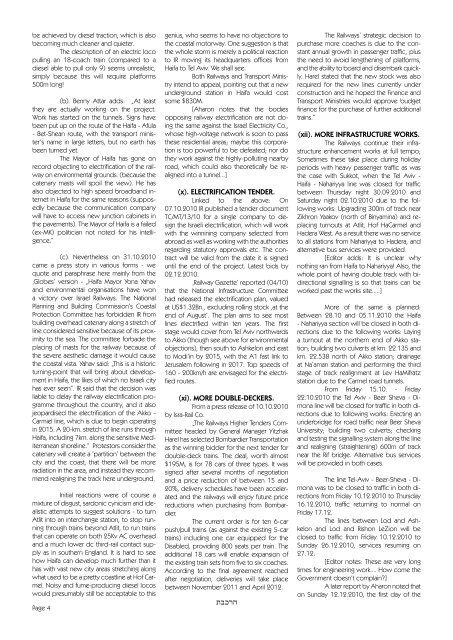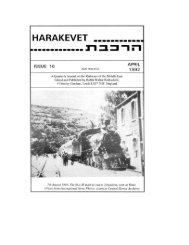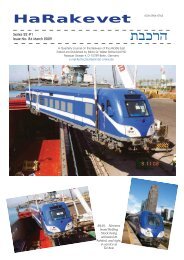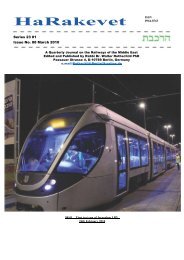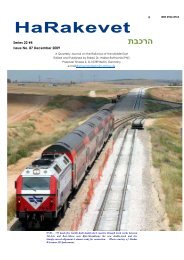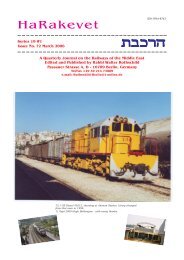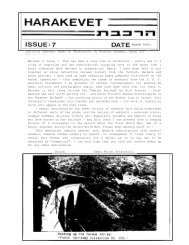You also want an ePaper? Increase the reach of your titles
YUMPU automatically turns print PDFs into web optimized ePapers that Google loves.
e achieved by diesel traction, which is also<br />
becoming much cleaner and quieter.<br />
The description of an electric loco<br />
pulling an 18-coach train (compared to a<br />
diesel able to pull only 9) seems unrealistic,<br />
simply because this will require platforms<br />
500m long!<br />
(b). Benny Attar adds: „At least<br />
they are actually working on the project.<br />
Work has started on the tunnels. Signs have<br />
been put up on the route of the Haifa - Afula<br />
- Bet-Shean route, with the transport minister‘s<br />
name in large letters, but no earth has<br />
been turned yet.<br />
The Mayor of Haifa has gone on<br />
record objecting to electrification of the railway<br />
on environmental grounds. (because the<br />
catenary masts will spoil the view). He has<br />
also objected to high speed broadband internet<br />
in Haifa for the same reasons (supposedly<br />
because the communication company<br />
will have to access new junction cabinets in<br />
the pavements). The Mayor of Haifa is a failed<br />
(ex-MK) politician not noted for his intelligence.“<br />
(c). Nevertheless on 31.10.2010<br />
came a press story in various forms - we<br />
quote and paraphrase here mainly from the<br />
‚Globes‘ version - „Haifa Mayor Yona Yahav<br />
and environmental organisations have won<br />
a victory over Israel Railways. The National<br />
Planning and Building Commission‘s Coastal<br />
Protection Committee has forbidden IR from<br />
building overhead catenary along a stretch of<br />
line considered sensitive because of its proximity<br />
to the sea. The committee forbade the<br />
placing of masts for the railway because of<br />
the severe aesthetic damage it would cause<br />
the coastal vista. Yahav said: „This is a historic<br />
turning-point that will bring about development<br />
in Haifa, the likes of which no Israeli city<br />
has ever seen“. IR said that the decision was<br />
liable to delay the railway electrification programme<br />
throughout the country, and it also<br />
jeopardised the electrification of the Akko -<br />
Carmiel line, which is due to begin operating<br />
in 2015. A 20-km. stretch of line runs through<br />
Haifa, including 7km. along the sensitive Mediterranean<br />
shoreline.“ Protestors consider the<br />
catenary will create a ‘partition’ between the<br />
city and the coast, that there will be more<br />
radiation in the area, and instead they recommend<br />
realigning the track here underground.<br />
Initial reactions were of course a<br />
mixture of disgust, sardonic cynicism and idealistic<br />
attempts to suggest solutions - to turn<br />
Atlit into an interchange station, to stop running<br />
through trains beyond Atlit, to run trains<br />
that can operate on both 25Kv AC overhead<br />
and a much lower dc third-rail contact supply<br />
as in southern England. It is hard to see<br />
how Haifa can develop much further than it<br />
has with vast new city areas stretching along<br />
what used to be a pretty coastline at Hof Carmel.<br />
Noisy and fume-producing diesel locos<br />
would presumably still be acceptable to this<br />
Page <br />
genius, who seems to have no objections to<br />
the coastal motorway. One suggestion is that<br />
the whole storm is merely a political reaction<br />
to IR moving its headquarters offices from<br />
Haifa to Tel Aviv. We shall see.<br />
Both Railways and Transport Ministry<br />
intend to appeal, pointing out that a new<br />
underground station in Haifa would cost<br />
some $830M.<br />
[Aharon notes that the bodies<br />
opposing railway electrification are not doing<br />
the same against the Israel Electricity Co.,<br />
whose high-voltage network is soon to pass<br />
these residential areas; maybe this corporation<br />
is too powerful to be defeated; nor do<br />
they work against the highly-polluting nearby<br />
road, which could also theoretically be realigned<br />
into a tunnel...]<br />
(x). ELECTRIFICATION TENDER.<br />
Linked to the above: On<br />
07.10.2010 IR published a tender document<br />
TC/MT/13/10 for a single company to design<br />
the Israeli electrification, which will work<br />
with the winnining company selected from<br />
abroad as well as working with the authorities<br />
regarding statutory approvals etc. The contract<br />
will be valid from the date it is signed<br />
until the end of the project. Latest bids by<br />
02.12.2010.<br />
‚Railway Gazette‘ reported (04/10)<br />
that the National Infrastructure Committee<br />
had released the electrification plan, valued<br />
at US$1.32Bn., excluding rolling stock ‚at the<br />
end of August‘. The plan aims to see most<br />
lines electrified within ten years. The first<br />
stage would cover from Tel Aviv northwards<br />
to Akko (though see above for environmental<br />
objections), then south to Ashkelon and east<br />
to Modi‘in by 2015, with the A1 fast link to<br />
Jerusalem following in 2017. Top speeds of<br />
160 - 200km/h are envisaged for the electrified<br />
routes.<br />
(xi). MORE DOUBLE-DECKERS.<br />
From a press release of 10.10.2010<br />
by Isra-Rail Co.<br />
„The Railways Higher Tenders Committee<br />
headed by General Manager Yitzhak<br />
Harel has selected Bombardier Transportation<br />
as the winning bidder for the next tender for<br />
double-deck trains. The deal, worth almost<br />
$195M, is for 78 cars of three types. It was<br />
signed after several months of negotiation<br />
and a price reduction of between 15 and<br />
20%, delivery schedules have been accelerated<br />
and the railways will enjoy future price<br />
reductions when purchasing from Bombardier.<br />
The current order is for ten 6-car<br />
push/pull trains (as against the existing 5-car<br />
trains) including one car equipped for the<br />
Disabled, providing 800 seats per train. The<br />
additional 18 cars will enable expansion of<br />
the existing train sets from five to six coaches.<br />
According to the final agreement reached<br />
after negotiation, deliveries will take place<br />
between November 2011 and April 2012.<br />
,cfrv<br />
The Railways’ strategic decision to<br />
purchase more coaches is due to the constant<br />
annual growth in passenger traffic, plus<br />
the need to avoid lengthening of platforms,<br />
and the ability to board and disembark quickly.<br />
Harel stated that the new stock was also<br />
required for the new lines currently under<br />
construction and he hoped the Finance and<br />
Transport Ministries would approve budget<br />
finance for the purchase of further additional<br />
trains.“<br />
(xii). MORE INFRASTRUCTURE WORKS.<br />
The Railways continue their infrastructure<br />
enhancement works at full tempo;<br />
Sometimes these take place during holiday<br />
periods with heavy passenger traffic as was<br />
the case with Sukkot, when the Tel Aviv -<br />
Haifa - Nahariyya line was closed for traffic<br />
between Thursday night 30.09.2010 and<br />
Saturday night 02.10.2010 due to the following<br />
works: Upgrading 300m of track near<br />
Zikhron Yaakov (north of Binyamina) and replacing<br />
turnouts at Atlit, Hof HaCarmel and<br />
Hadera West. As a result there was no service<br />
to all stations from Nahariyya to Hadera, and<br />
alternative bus services were provided.<br />
[Editor adds: It is unclear why<br />
nothing ran from Haifa to Nahariyya! Also, the<br />
whole point of having double track with bidirectional<br />
signalling is so that trains can be<br />
worked past the works site.....]<br />
More of the same is planned:<br />
Between 28.10 and 05.11.2010 the Haifa<br />
- Nahariyya section will be closed in both directions<br />
due to the following works: Laying<br />
a turnout at the northern end of Akko station;<br />
building two culverts at km. 22.135 and<br />
km. 22.538 north of Akko station; drainage<br />
at Na’aman station and performing the third<br />
stage of track realignment at Lev HaMifratz<br />
station due to the Carmel road tunnels.<br />
From Friday 15.10. - Friday<br />
22.10.2010 the Tel Aviv - Beer Sheva - Dimona<br />
line will be closed for traffic in both directions<br />
due to following works: Erecting an<br />
underbridge for road traffic near Beer Sheva<br />
University; building two culverts; checking<br />
and testing the signalling system along the line<br />
and realigning (straightening) 600m of track<br />
near the Rif bridge. Alternative bus services<br />
will be provided in both cases.<br />
The line Tel-Aviv - Beer-Sheva - Dimona<br />
was to be closed to traffic in both directions<br />
from Friday 10.12.2010 to Thursday<br />
16.12.2010, traffic returning to normal on<br />
Friday 17.12.<br />
The lines between Lod and Ashkelon<br />
and Lod and Rishon LeZion will be<br />
closed to traffic from Friday 10.12.2010 to<br />
Sunday 26.12.2010, services resuming on<br />
27.12.<br />
[Editor notes: These are very long<br />
times for engineering work.... How come the<br />
Government doesn‘t complain?]<br />
A later report by Aharon noted that<br />
on Sunday 12.12.2010, the first day of the


